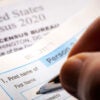Coming out of the bitterly-fought midterm elections, it’s easy to feel as though the United States has reached unprecedented levels of partisanship, but new research and lessons from our own history paint a different picture.
The American people actually have more in common on issues that matter than many would believe. The disconnect stems from incivility in our discourse that prevents us from compromising.
A new report, “Hidden Tribes,” based on a comprehensive yearlong study by social scientists, found surprising results about what our fellow citizens really think about politics. It shows that 67 percent of us—the “Exhausted Majority”—are fed up with today’s political polarization, support more moderate policies, and seek compromise rather than political warfare. In fact, only a third of Americans truly occupy the furthest fringes on the left and right.
Then why does the political landscape not reflect this?
Systematic forces in American politics such as gerrymandering and the two-party system could provide some explanation, but there’s a more corrosive problem that has seeped into our everyday lives—the decline of civil discourse.
Party fringes and their toxic rhetoric are garnering prime-time slots in our news segments and feeds. Debasing commentary like categorizing all immigrants as criminals or all policemen as prejudiced incites feelings of hatred, negative attitudes, and undermines confidence in the media. It polarizes us and fosters division where there could be compromise, because potential allies have become enemies or stay decidedly silent.
If we could stop the name calling and hurtful memes, and instead promote open, honest, and civil debate, we would be more likely to find common ground and open the door to compromise. Civility is one of the only ways to reach the die-hard partisans, while giving the moderate voter the opportunity to voice their concerns or support, without being vilified.
At a recent retreat put on by the Fund for American Studies, I had the pleasure of joining young leaders to discuss what civility means in the modern political context. The Fund for American Studies is an educational organization that brings hundreds of Republicans, Democrats, and independents from across the country to Washington, D.C., for programs that prepare them to be tomorrow’s leaders.
But for this event, we actually traveled into the past—and out beyond the Washington beltway—to see how American history could inform current events.
While visiting Gettysburg, Pennsylvania, the site of one of the bloodiest battles of the Civil War, we studied the landmark Lincoln-Douglas debates, where in 1858, the two politicians faced off with sharply contrasting convictions. Abraham Lincoln had staked his name on limiting the institution of slavery. His opponent, Stephen Douglas, believed with equal conviction that states should make decisions on the question of slavery, arguing for state sovereignty.
The two men laid out their best arguments for the voters of Illinois in seven substantive debates. Despite their differences, both men spoke respectfully—not attacking each other’s characters, but focusing on delivering sound arguments—so voters could leave with a clear idea of where each side stood on the issues of the day.
I would be remiss to say these debates prevented the Civil War—they didn’t. But the civility of each candidate toward one another and their opponents generally helped to defer the war for three years, and once the war ended, Lincoln’s record of civility and compromise had laid the groundwork for bringing the Union back together, albeit slowly.
The idea of a “Lincoln-Douglas debate” format seems quaint today, when even Supreme Court confirmation hearings become opportunities for political grandstanding and divisiveness. However, I came away from Gettysburg with optimism. If Lincoln and Douglas could debate their ideas with civility under those circumstances, there’s no reason to hold modern politicians to a different standard.
Overall, my plea is simple: be kind. The recovery of bipartisanship in America is attainable if we return to civil discourse. We must take it upon ourselves to see an opposing viewpoint as a policy difference and not an existential conflict over race and culture, leaving room for compromise. Because beyond the shouting voices, most Americans still do agree where it matters most.




























